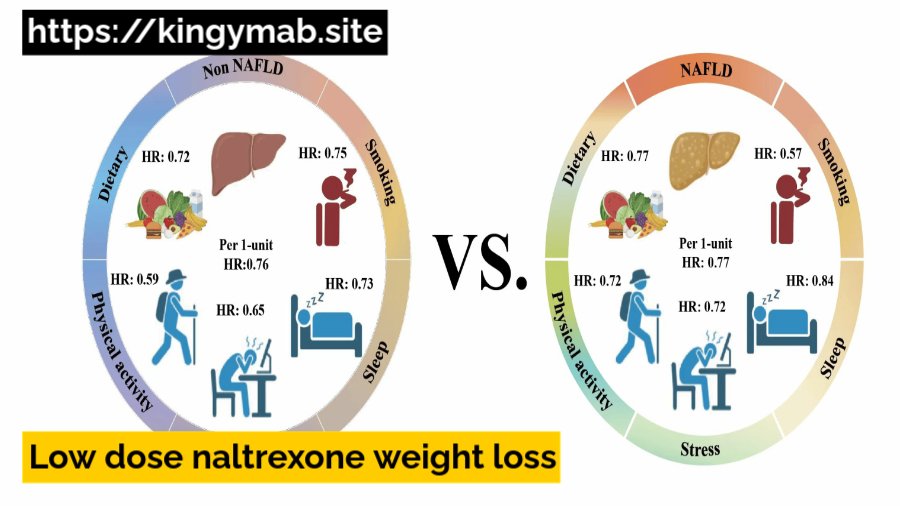What’s the deal? I’d like to start with low dose naltrexone weight loss which is gaining much attention in the context of weight management. Naltrexone is widely used in treating opioid addiction but why discuss it in context of weight loss?
Well, you see, it is advisable that we discuss it. Let us all understand together what exactly naltrexone is, how it works and if it is safe for those of us who wish to drop some extra weight.
What is the Naltrexone drug?
Opioid dependency treatment or Alcohol dependence, naltrexone is an effective drug in many situations, opioid dependency being one of them. The drug achieves its goal through receptor blockade in the brain which lowers cravings.
As with many things lately, I have begun watching interesting research related to its role in managing weight loss in conjunction with bupropion.
What’s the need for weight reduction?
Obesity can hardly be equated to just any one number on the scale but is better understood as a disease affecting thousands of individuals round the globe. It is important for all those considering naltrexone to understand the mechanism involved and how it can assist in losing weight.

Key Points
- Efficacy of Naltrexone: Research shows that naltrexone can lead to significant weight loss when used alone or with bupropion. In fact, studies indicate that people can lose an average of about 5 kg over a year!
- Safety Profile: Most studies report that naltrexone is well-tolerated, with few serious side effects. That’s definitely something I find reassuring.
- Combination Therapy: Using naltrexone alongside bupropion may enhance weight loss effects compared to either drug alone. It’s like they work better together!
How Does Naltrexone Work?
So, this is a medication that assists in how to lose weight? Naltrexone works by blocking the opioid receptors located in the areas of the brain that mediate the reward system. What this means is it can help lower the desire to indulge in those delicious, high-calorie junk food we can’t avoid.
Efficacy Studies
I’ve read some fascinating studies on this topic. Here’s a quick summary of what I found:
| Study Type | Weight Loss Achieved |
| Meta-Analysis | Average weight reduction: 5 kg |
| Randomized Controlled Trials | 55% lost at least 5% of body weight over one year |
These results are pretty impressive! They show that many people using naltrexone/bupropion achieve greater weight loss compared to those taking a placebo.
• Very Common Side Effects: Nausea (approximately 7% of patients), headache (2% of patients), anxiety (2% of patients), and insomnia (1% of patients) are the commonly reported side effects of the drug. .
• Aspects of Safety Related to Long-term Use: Based on the available literature, serious side effects of long-term use of naltrexone appear to be rare. However routine visits to a healthcare provider are always advisable.
Naltrexone in The Context of Other Available Weight Loss Medications.
In the context of other weight reduction medications, it might be helpful comparing naltrexone to other drug alternatives.
• Comparison Relation to Other Drug Therapies: While some drugs which are appetite suppressants may work only on the appetite; naltrexone’s focus is also the reward center of the brain.
• Therapeutic Efficacy and Spherical Comparison: Any medication choice might have more severe or less effective side effects. But with naltrexone, it seems to have struck a balanced treatment plan to some degree.
Patients Who Stand to Benefit from Naltrexone Treatment:
It is important to note that not all patients would be eligible for such treatments like naltrexone. .
• Eligible Patients: Broadly health practitioners may recommend naltrexone for patients with a body mass index (BMI) >30 kg/m2 or for those patients with weight related chronic diseases. .
• BMI Risk Prediction Models and Comorbidities: Other comorbidities include metabolic syndrome and cardiovascular events, which generally speaking would predict whether a patient qualifies for this treatment.
Lifestyle Modifications Are Crucial.
The need to take medications in conjunction with integrating lifestyle modifications cannot be overstressed.
• Using Combined Medications: Naltrexone is shown to improve effectiveness in combination with behavioral aides.
• Things To Change: Dietary habits, engage in physical activity, and enroll in weight-related behavior change groups.

Cost and Accessibility
Now, let’s talk money for a moment as this paves a better understanding of whether treatment options can be pursued.
• Cost Factors: The monthly cost of naltrexone without insurance hovers between two hundred and four hundred us dollars depending on the providers’ discretion.
• Accessibility: Naltrexone is available from most pharmacies but only if one possesses a doctor’s prescription outlining its administration for weight reduction.
Regulatory Status
It may also be important for other readers to be acquainted with the amount of naltrexone this resource lens has for prescriptions.
• FDA Approval Status: The FDA does approve the medication naltrexone in combination with bupropion for the chronic weight gain treatment plan in adults who are either overweight or are obese.
Real Stories Matter
Personal testimonials often help to understand how this treatment works in the real world.
• Patient Testimonials: There are numerous patients who have recommended the usage of naltrexone to assist with weight loss and have pointed out that apart from their weight, their health and overall quality of life has improved with naltrexone treatment.
Potential Directions for Future Investigation
We do need larger cohorts’ studies to assess the long-term efficacy as the current studies are best viewed with optimistic caution.
• Phenomenon Still to be Studied: Effective future research should include collection of detailed long term safety data and how different populations may be affected differently over longer durations.

Conclusion
So here we are! Naltrexone appears to be a suitable candidate from a variety of naltrexone alternatives available to most of us who desire an effective approach to weight loss.
Several studies provide evidence of naltrexone’s effectiveness vis a vis weight loss.
Clinical data has shown it to have a good safety profile.
Therapeutic regimes involving appropriate medication and lifestyle changes will be the most effective way to achieve success in the long run.
FAQs
What is Naltrexone?
Naltrexone is mainly used in the treatment of opioid drug dependence. It has also been used to assist in weight loss by acting upon appetite and dampening it through opioid receptors.
How effective is Naltrexone for weight loss?
Current literature suggests that patients taking naltrexone/Bupropion could effectively lose weight than those on the placebo with an average reduction in weight of about 5 kilos for some studies over a year timeframe.
Naltrexone, are there any side effects that could be linked to it?
Most patients tolerate naltrexone well, experiencing mild side effects like nausea, headache, and insomnia. Serious side effects are rare but should be monitored in a healthcare setting.
I hope this helps you understand how naltrexone can fit into your weight management plan. Feel free to reach out with any questions or to share your experiences!
Naltrexone, how much weight can you expect to lose?
I’ve noticed that weight loss with naltrexone depends a lot on the individual and their lifestyle. Some people may lose around 5-10% of their body weight in a few months with LDN, but it only works well for some. Metabolism and dedication to healthy habits play a big role in the results.
What is the most suitable dose of naltrexone, which will assist in losing weight?
As far as I have come to understand, low dose naltrexone (LDN) ranges from 1.5 mg to 4.5 mg2 is the most effective range for weight loss.
There is a general trend among doctors to start off with a lower dosage and then modify it serially so as to have the lowest number of side effects while still receiving the desired effect of the dosage.
When is the best time of the day to take naltrexone for weight loss?
I think the body’s response to the dosage matters, and many people take it at night to curb appetite and cravings. However, for those with sleep issues, taking it in the morning might be a better option.
What are the most effective doses of low dose naltrexone for weight loss?
Regarding the weight loss and cravings, ones with low dose naltrexone positively assess this molecule, no doubt. Such treatments do work well though it is understandable that not all individuals have the same views and some individuals integrate LDN with a healthy and active lifestyle to see any noticeable results.
What are the side effects of taking low dose naltrexone?
In my medication diary, I note the importance of avoiding alcohol and opiates while using low dose naltrexone. LDN blocks opioid receptors, making it risky to use these substances together. I always consult my physician before starting any new supplements for safety.
How long does it take for naltrexone 1 mg to achieve weight loss results?
Low dose naltrexone seems to have varying effects on different individuals as from my experience, it takes anywhere between week to couple of months to see the weight loss effects.
It is true some people may see results quicker, but my observation is in order to see those results, weight loss medication’s full strength should be given a few months to show up while a healthy lifestyle should also be adopted.
Why Taking LDN in the morning is Beneficial?
I believe taking LDN in the morning has its perks. It can help avoid sleep issues and may allow for better control over energy levels and appetite, which is a big advantage for those trying to manage their weight throughout the day.
Naltrexone 50 mg weight loss reviews
Based on my research, the 50 mg dose of naltrexone isn’t usually used for weight loss; it’s more common in treating addiction. Even though it might help with cravings, I’ve read that people are less likely to use such a high dose for weight management due to the risk of more side effects compared to using low dose naltrexone.
Contact Us for Guest post submission





